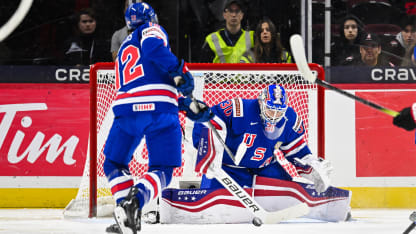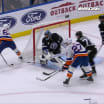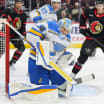The NHL Network will air every game of the 2025 IIHF World Junior Championship in Ottawa. It includes comprehensive coverage of the United States National Junior Team, which will play Czechia in the semifinals at Canadian Tire Centre on Saturday (7:30 p.m. ET). In the quarterfinal round on Thursday, the U.S. defeated Switzerland 7-2, and Czechia defeated Canada 4-3.
NHL Network's E.J. Hradek will handle play-by-play with former NHL forward Tony Granato offering color commentary. Mike Kelly and Jon Morosi also will be part of the coverage, and longtime NCAA hockey analyst Dave Starman will provide in-studio analysis and will give his three keys to victory for the United States before each of its games during the 11-day tournament.
"No surprise the United States defeated Switzerland handily and it shows how important seeding is in this tourney," Starman said. "Personally, I think we should be going back to top three per pool crossing over as there's a big difference between the third-place team and the fourth. Latvia, or as E.J. Hradek and I like to call them, the pesky Latvians, gave Sweden more than they expected but the Swedes in the medal round have been extremely undependable at World Juniors. The Swiss came out flying, but the reality was they played well for about two minutes. An interesting conversation between myself and the U.S. staff recently was centered on how well the Americans would handle success. After an emotional win against Canada on Dec. 31, how would they come out versus a team they knew they were much better than, and they handled it well.
"So, on to Czechia. Before the tournament, my opinion was the two worst matchups for the U.S., in order, were Czechia and Finland. Each play hard, limit time and space, defend middle ice, play five in the frame, and have goaltending. Each can score and each demand some skin when you play in hard areas. It's a great matchup for the fans, and a huge test for the U.S."
Here are Starman's 3 keys to victory for the United States against Czechia:
1. Czechia transition
"Czechia can transition and stretch the rink. They don't match the U.S. speed, no one in the tourney does. What the Czechs can do is get up ice quick and are deliberate in their puck movement. They don’t worry about pretty hockey, but they are skilled and deep enough to play it. They rely on going in straight lines up ice with numbers and can find that home run pass. What's funny is if you look at the analytics report [from the game], you'd think Canada won. Czechia passes the eyeball test. They're a good 'little things' team."
2. Staying special
"This game at 5-on-5 is interesting ... this game at 5-on-4 is another story based on what we've seen. No one can kill penalties in the late stages of the tourney, the skill of every team's top power-play unit is just way too good. The U.S. power play is a game-changer and Czechia's power play has been impactful. So, that stick to the back of the legs, the scrum where you push your opponent one too many times ... this is not the game for it. Don't believe me? Ask Canada, which lost to Czechia on a late power-play goal."
3. Goalie guild
"These games can come down to goaltending and you have the two best in the tourney and maybe in the NCAA, going at it. Michigan State's Trey Augustine is the likely starter for the U.S. and if he doesn't play for some reason, Hampton Slukynsky of Western Michigan is the goalie for the top team in college hockey's best conference, the NCHC. Augustine is 2-1 with a 2.97 goals-against average and .912 save percentage and was brilliant against Canada. Slukynsky is 2-0, has a 1.50 GAA and .938 save percentage. Augustine has played the two best teams the U.S. has faced, beating Canada, and losing in overtime to Finland. University of Massachusetts goalie Michael Hrabal of Czechia is 3-1, a 2.52 GAA and a .921 save percentage. He was lights-out brilliant in a shootout loss to the U.S. at the 2024 WJC and has been on fire this year in Ottawa after having just bounced the Canadians for the second straight year."


















